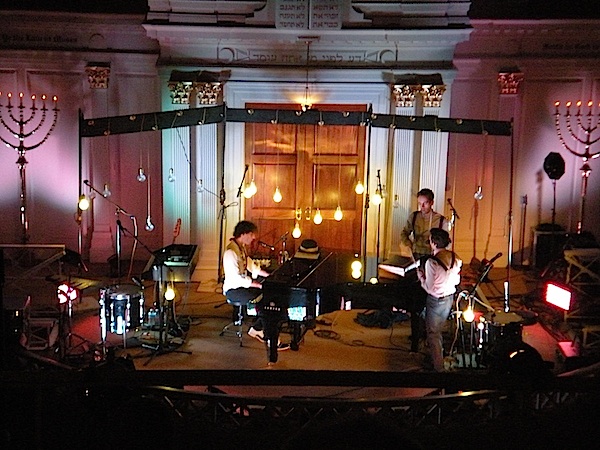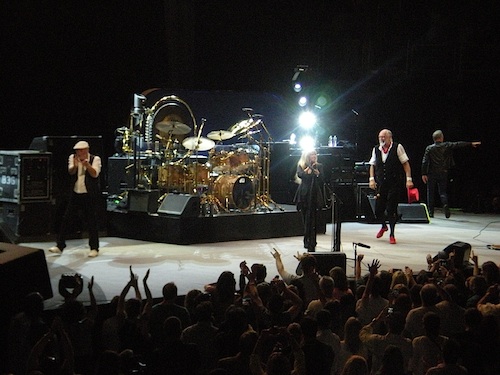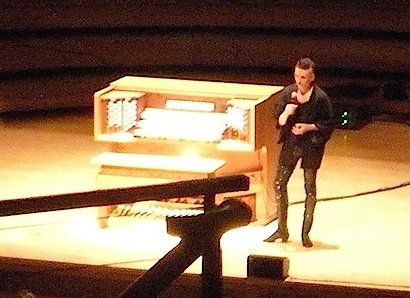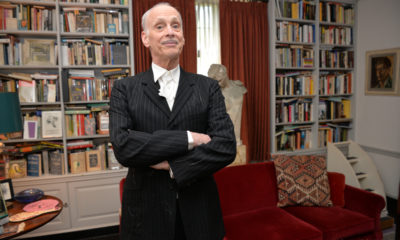Arts & Entertainment
Magical music nights
Great concert week in DC with the Mac, Mika and Cameron Carpenter
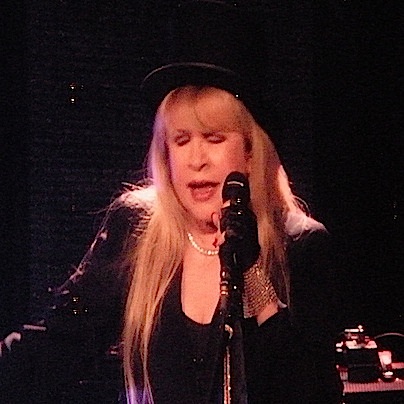
It was a great week for live music in Washington — Fleetwood Mac brought its “Tour 2013” to the Verizon Center Tuesday night, out pop singer Mika brought his acoustic show to the Sixth & I Synagogue Wednesday night and on Friday, queer organist Cameron Carpenter made his Washington-area debut at the Strathmore in Bethesda. The proceedings were stellar all around — I’ll dissect chronologically.
Many, many years of following various pop and rock acts has brought me to the realization that so many acts sort of “train” their audiences what to expect and the Mac is a perfect example. Its members — namesake rhythm section Mick Fleetwood and John McVie along with singer/songwriters Stevie Nicks and Lindsey Buckingham — talk in interviews as if they’re dutifully restricted from mixing things up too much because even with longtime songstress Christine McVie long gone (only one of her songs was performed — the chestnut “Don’t Stop”), they still have a truckload of ground they feel obligated to cover with songs like “Second Hand News,” “The Chain,” “Dreams,” “Rhiannon,” “Go Your Own Way” and the list goes on and on.
Thankfully the Mac — touring a second consecutive time now without a new album out — is throwing in a few surprises. Nicks has revived the long-dormant “Tusk” track “Sisters of the Moon” for the first time since the “Mirage Tour” in the early ’80s. There’s also one all-new track (“Sad Angel”) Buckingham says is slated for an imminent EP and the ancient-but-never-released song “Without You,” a ballad that featured perhaps the loveliest Buckingham/Nicks harmonies of the evening.
Except for some very anti-Mac-like remix-type looping touches brought into “World Turning,” the arrangements were tried and true. Nobody could argue the Mac doesn’t know how to give the masses what they want. Which can be a little disappointing for the die hards who go hear them every time they tour. Or even the more casual fans who tend to be more musically adventurous. Though many of the suggestions thrown about are utterly absurd — Thomas Conner’s naive op-ed in the Chicago Sun-Times last week is a great example — I could have gone for maybe 10 percent more adventure. A good starting point would have been “Soldier’s Angel,” the haunting duet Buckingham joined Nicks on for her brilliant 2011 album “In Your Dreams.”
With some acts — Madonna for one — you know you’re not going to hear every hit every tour. The Mac has never been like this, yet a few more unexpected moments would keep them a notch or two further away from the “cashing in/gravy train” bandwagon they’re clearly on. If you think for a second this is about the music and not the money, recall the arm twisting it took to get Nicks to agree to this. There was a well-publicized ballyhoo in 2012 when Fleetwood whined in a Playboy interview that he doubted the Mac would ever tour again when Nicks insisted on giving her solo album another year of touring. It was so wildly overstated that here they are on tour the very next year. (Nicks said later three years — and she’s right — feels like a good amount of time to go between Mac tours.)
While the band has been more about money than music for eons, I will say a few quick things: one, the music at Tuesday night’s show was scary good. Nicks, though she doesn’t scream and growl as she used to, has developed into a very solid singer. There wasn’t one off-pitch sound that came from her mouth the whole night. And Buckingham’s guitar work was as great as it has ever been. If there’s one upside to the lack of Mac recordings in the last 10 years or so, it’s that Buckingham’s solo career has soared off in the other direction with a trio of masterfully conceived and executed solo albums (2006’s “Under the Skin,” 2008’s “Gift of Screws” and 2011’s “Seeds We Sow”).
Given the way the Internet has decimated album sales — especially new work from veteran acts — one can hardly argue with their “let’s just tour” approach. Still nobody seemed to notice the irony of the situation when Buckingham spoke about not wanting to run something that worked (“Rumours”) into the ground when it came time to make “Tusk.” Sadly now the band is doing almost exactly that — touring clearly works (I’ve never seen the Verizon Center so packed and on a weeknight no less) so why be bothered with doing a new album? While the night was great fun, the reality that the Mac seems highly uninterested in doing much beyond trudging out the staples — Nicks is the chief foot dragger — lent the proceedings a bittersweet air.
And why can’t we all just agree to let Christine McVie do what she wants? Legions of the Mac faithful seem to be holding out hope that she’ll one day rejoin them for one last outing. While yeah, that would be cool for “old time’s sake” (McVie said recently she would consider joining them on stage in London if they ask her later this year), they’ve already done that. Why do we need another “The Dance”-type outing (the name of a ’97 reunion tour with the classic lineup), especially if McVie’s heart is not in it? I would feel differently if they’d never done “The Dance,” but since they have, it’s time for everybody to move on.
Mika’s show the next night was an interesting study in contrasts — from a veteran band reliving its glory days to a young singer (he’s 29) only on his third album playing a small, atmosphere-heavy synagogue (it’s actually a great concert spot — much more music-friendly than the much-lauded 9:30 Club) with a throng of young fans at fever-pitch excitement throughout the evening. Touring behind his near-masterpiece album of last fall “Origin of Love,” the obscenely talented popster poured his passionately creamy falsetto-hued vocals and drivingly percussive piano playing through a nearly two-hour set that was the furthest thing from phoned in you could imagine.
Working with a tight two-man band — players who seemed to grab any instrument of the dozens on stage they could quickly get their hands on — Mika radically reinvented several songs from their studio versions (a ballad version of dance cut “Stardust” from the new album was perhaps the most radical), led several all-out audience sing-alongs (and the crowd knew every word) on “Grace Kelly,” “Love Today” and “Celebrate” among others, and even stepped away from the mic for nearly two full numbers just to savor the acoustics — which are stellar — of the venue. All were show-stopping in the best way.
Mika truly has it all — killer voice, great songwriter, solid musical chops and just-left-enough-of-center looks and charm to never be mistaken for a “Bachelor” contestant. He’s sort of our queer Justin Timberlake — with a much better current album out too, by the way.
Switching gears radically was Cameron Carpenter’s organ recital Friday night which, despite a few logistical head scratchers (more on that in a sec), was a musical accomplishment of Herculean, truly other-worldly proportions. Watching and hearing him play is much akin to the scene in the classic “Outer Limits” episode (“The Sixth Finger”) in which a scientist figures out a way to push evolution ahead a million years and suddenly the protagonist can play Bach he just picked up. Carpenter is almost in that league, having been something of a child prodigy who claims to have mastered “The Well-Tempered Clavier” in adolescence.
The first oddity was why Carpenter — with all the amazing pipe organs in Washington — was at the organ-less Strathmore at all. Playing an electronic Rodgers three manual brought in just for the occasion, Carpenter got more sonic contrast out of the thing than probably anybody else could have, but from the massive instrument at the National Cathedral, the new pipe organ at the Kennedy Center (where he’s rumored to be playing next year sometime) or even the glorious five-manual behemoth at National City Christian Church in Thomas Circle (which could just about have housed the somewhat disappointing turnout — of the Strathmore’s three balconies, only the lowest one was about half-full; the upper two sat empty), it seemed just plain dumb to have him there. It could be a harbinger of things to come — Carpenter’s most insistent recurring theme is his endless frustration at having to adapt to a different organ for each town he plays. Let’s hope whatever touring instrument he ends up with — he says it’s almost finished — has a little more sonic heft than the Rodgers. Which sounded OK — I’m not trashing it altogether. One could clearly tell, though, that it was a sound coming from speakers, not pipes.
That said, what Carpenter did with it was beyond staggering. His musical instincts — as sharp and deadly as Wolverine’s knife claws — are in a league of their own among organists, at least to my knowledge. He plays with a pianistic-like virtuosity that’s stunning to watch (a screen above him amplified his finger work). Often playing two manuals simultaneously with one hand, leap-frogging between the choir, great and swell like an Olympic sprinter and displaying the most nimble pedal work I’ve ever seen, Carpenter truly is a talent for the ages. Granted, the Rodgers had a minimal number of stops it appeared — it looked like a child’s toy compared to, say, the National City console — yet Carpenter changed registrations like most people blink. One five-minute improvisation he played featured more than 40 registration changes. That amount of tone painting just through stop changes was impressive in and of itself, forget about the actual note playing.
His wildly eclectic 100-odd minute show (played entirely from memory) featured everything from Bach works written for organ, transcribed for piano, then adapted back to organ (by Carpenter), two Liszt Transcendental Etudes he said were “nearly impossible to play,” a wickedly playful transcription of Bernstein’s “Candide” Overture and a playful encore/fantasia on — of all things — “Shortnin’ Bread,” a whimsical-but-no-less-dramatic way to end the evening. The highlights for me were a moody and languid — yet endlessly colorful — transcription of Isaac Albeniz’s piano work “Evocacion” (the first movement from “Iberia”) and a fantastically creative Marcel Dupre arrangement of a French Noel that Carpenter tackled in a deliciously subversive way, nearly matching the macabre wit Dupre brought to it originally.
Though nearly as night and day as one could fathom, all three shows were utterly magical and evenings I will never forget.
Fleetwood Mac’s set:
1. Second Hand News
2. The Chain
3. Dreams
4. Sad Angel
5. Rhiannon
6. Not That Funny
7. Tusk
8. Sisters of the Moon
9. Sara
10. Big Love
11. Landslide
12. Never Going Back Again
13. Without You
14. Gypsy
15. Eyes of the World
16. Gold Dust
17. So Afraid
18. Stand Back
19. Go Your Own Way
ENCORE
20. World Turning
21. Don’t Stop
ENCORE 2
22. Silver Springs
23. Say Goodbye
Mika’s set:
1. Grace Kelly
2. Toy Boy
3. Lollipop
4. Blue Eyes
5. Billy Brown
6. Popular
7. Love You When I’m Drunk
8. Underwater
9. Stuck in the Middle
10. Emily
11. Big Girls
12. Origin of Love
13. Happy Ending
14. Lola
15. Relax, Take it Easy
16. Stardust
17. Celebrate
18. Love Today
19. Over My Shoulder
Cameron Carpenter’s set:
1. Bach — Prelude 1 from “Well Tempered Clavier”/Fugue No. 15 in G Major
2. Bach/Busoni — Cello Suite No. 1
3. Bach — Fantasia and Fugue in G Minor
4. Albeniz — Evocacion from Iberia
5. Dupre — Variations on a Noel
6. Liszt — Feux Follets
7. Liszt — La Campanella
INTERMISSION
8. Bernstein — Candide Overture
9. Ives — The Alcotts from Concord Sonata
10. Improv
11. Improv
ENCORE
12. Chopin — Minute Waltz
13. Shortnin’ Bread
Out & About
The Rare Book Fair is coming to D.C.
Over 35 antiquarian booksellers from across the country to attend

The Capital Rare Book Fair will bring more than 35 antiquarian booksellers from across the country to D.C. from Friday, May 3 to Sunday, May 5 at the historic University Club at 1135 16th St., N.W.
This year, the fair will take over two floors in the illustrious mansion on 16th Street and showcase thousands of beautiful, notable, and rare books, maps, and historic documents from around the globe. Exceptional examples that will be offered include leaf 27 of a 40-leaf xylographic Biblia pauperum, a picture Bible from 1465 for $85,000 from Bruce McKittrick Rare Books, among many other intriguing selections.
Tickets are $50 and more information is available on the event’s website.

Friday, April 19
Center Aging Friday Tea Time will be at 2 p.m. on Zoom. This is a social hour for older LGBTQ adults. Guests are encouraged to bring a beverage of choice. For more information, email [email protected].
Go Gay DC will host “Drag Pageant” at 8 p.m. at Freddie’s Beach Bar and Restaurant. Net proceeds from this event will benefit EQUALITY NoVa, the local nonprofit organization dedicated to advancing equality in Northern Virginia. Attendance is free and more details are available on Eventbrite.
Saturday, April 20
LGBTQ People of Color Support Group will be at 1 p.m. on Zoom. This peer support group is an outlet for LGBTQ People of Color to come together and talk about anything affecting them in a space that strives to be safe and judgment free. For more details, visit thedccenter.org/poc or facebook.com/centerpoc.
Go Gay DC will host “LGBTQ+ Brunch” at 11 a.m. at Freddie’s Beach Bar & Restaurant. This fun weekly event brings the DMV area LGBTQ community, including allies, together for delicious food and conversation. Attendance is free and more details are available on Eventbrite.
Sunday, April 21
Go Gay DC will host “LGBTQ+ Dinner” at 7 p.m. at Federico Ristorante Italiano. Attendance is free and more details are available on Eventbrite.
AfroCode DC will be at 4 p.m. at Decades DC. This event will be an experience of non-stop music, dancing, and good vibes and a crossover of genres and a fusion of cultures. Tickets cost $40 and can be purchased on Eventbrite.
Monday, April 22
Center Aging: Monday Coffee & Conversation will be at 10 a.m. on Zoom. This is a social hour for older LGBTQ adults. Guests are encouraged to bring a beverage of their choice. For more details, email [email protected].
Tuesday, April 23
Pride on the Patio Events will host “LGBTQ Social Mixer” at 5:30 p.m. at Showroom. Dress is casual, fancy, or comfortable. Guests are encouraged to bring their most authentic self to chat, laugh, and get a little crazy. Admission is free and more details are on Eventbrite.
Genderqueer DC will be at 7 p.m. on Zoom. This is a support group for people who identify outside of the gender binary. Whether you’re bigender, agender, genderfluid, or just know that you’re not 100% cis. For more details, visit genderqueerdc.org or Facebook.
Wednesday, April 24
Job Club will be at 6 p.m. on Zoom. This is a weekly job support program to help job entrants and seekers, including the long-term unemployed, improve self-confidence, motivation, resilience and productivity for effective job searches and networking — allowing participants to move away from being merely “applicants” toward being “candidates.” For more information, email [email protected] or visit [email protected].
Asexual and Aromantic Group will be at 7 p.m. on Zoom. This is a space where people who are questioning this aspect of their identity or those who identify as asexual and/or aromantic can come together, share stories and experiences, and discuss various topics. For more details, email [email protected].
Thursday, April 25
The DC Center’s Fresh Produce Program will be held all day at the DC Center for the LGBT Community. People will be informed on Wednesday at 5:00 pm if they are picked to receive a produce box. No proof of residency or income is required. For more information, email [email protected] or call 202-682-2245.
Virtual Yoga with Charles M. will be at 7 p.m. on Zoom. This is a free weekly class focusing on yoga, breath work, and meditation. For more details, visit the DC Center for the LGBT Community’s website.
Movies
After 25 years, a forgotten queer classic reemerges in 4K glory
Screwball rom-com ‘I Think I Do’ finds new appreciation

In 2024, with queer-themed entertainment available on demand via any number of streaming services, it’s sometimes easy to forget that such content was once very hard to find.
It wasn’t all that long ago, really. Even in the post-Stonewall ‘70s and ‘80s, movies or shows – especially those in the mainstream – that dared to feature queer characters, much less tell their stories, were branded from the outset as “controversial.” It has been a difficult, winding road to bring on-screen queer storytelling into the light of day – despite the outrage and protest from bigots that, depressingly, still continues to rear its ugly head against any effort to normalize queer existence in the wider culture.
There’s still a long way to go, of course, but it’s important to acknowledge how far we’ve come – and to recognize the efforts of those who have fought against the tide to pave the way. After all, progress doesn’t happen in a vacuum, and if not for the queer artists who have hustled to bring their projects to fruition over the years, we would still be getting queer-coded characters as comedy relief or tragic victims from an industry bent on protecting its bottom line by playing to the middle, instead of the (mostly) authentic queer-friendly narratives that grace our screens today.
The list of such queer storytellers includes names that have become familiar over the years, pioneers of the “Queer New Wave” of the ‘90s like Todd Haynes, Gus Van Sant, Gregg Araki, or Bruce LaBruce, whose work at various levels of the indie and “underground” queer cinema movement attracted enough attention – and, inevitably, notoriety – to make them known, at least by reputation, to most audiences within the community today.
But for every “Poison” or “The Living End” or “Hustler White,” there are dozens of other not-so-well-remembered queer films from the era; mostly screened at LGBTQ film festivals like LA’s Outfest or San Francisco’s Frameline, they might have experienced a flurry of interest and the occasional accolade, or even a brief commercial release on a handful of screens, before slipping away into fading memory. In the days before streaming, the options were limited for such titles; home video distribution was a costly proposition, especially when there was no guarantee of a built-in audience, so most of them disappeared into a kind of cinematic limbo – from which, thankfully, they are beginning to be rediscovered.
Consider, for instance, “I Think I Do,” the 1998 screwball romantic comedy by writer/director Brian Sloan that was screened last week – in a newly restored 4K print undertaken by Strand Releasing – in Brooklyn as the Closing Night Selection of NewFest’s “Queering the Canon” series. It’s a film that features the late trans actor and activist Alexis Arquette in a starring, pre-transition role, as well as now-mature gay heartthrob Tuc Watkins and out queer actor Guillermo Diaz in supporting turns, but for over two decades has been considered as little more than a footnote in the filmographies of these and the other performers in its ensemble cast. It deserves to be seen as much more than that, and thanks to a resurgence of interest in the queer cinema renaissance from younger film buffs in the community, it’s finally getting that chance.
Set among a circle of friends and classmates at Washington, D.C.’s George Washington University, it’s a comedic – yet heartfelt and nuanced – story of love left unrequited and unresolved between two roommates, openly gay Bob (Arquette) and seemingly straight Brendan (Christian Maelen), whose relationship in college comes to an ugly and humiliating end at a Valentine’s Day party before graduation. A few years later, the gang is reunited for the wedding of Carol (Luna Lauren Vélez) and Matt (Jamie Harrold), who have been a couple since the old days. Bob, now a TV writer engaged to a handsome soap opera star (Watkins), is the “maid” of honor, while old gal pals Beth (Maddie Corman) and Sarah (Marianne Hagan), show up to fill out the bridal party and pursue their own romantic interests. When another old friend, Eric (Diaz), shows up with Brendan unexpectedly in tow, it sparks a behind-the-scenes scenario for the events of the wedding, in which Bob is once again thrust into his old crush’s orbit and confronted with lingering feelings that might put his current romance into question – especially since the years between appear to have led Brendan to a new understanding about his own sexuality.
In many ways, it’s a film with the unmistakable stamp of its time and provenance, a low-budget affair shot at least partly under borderline “guerilla filmmaking” conditions and marked by a certain “collegiate” sensibility that results in more than a few instances of aggressively clever dialogue and a storytelling agenda that is perhaps a bit too heavily packed. Yet at the same time, these rough edges give it a raw, DIY quality that not only makes any perceived sloppiness forgivable, but provides a kind of “outsider” vibe that it wears like a badge of honor. Add to this a collection of likable performances – including Arquette, in a winning turn that gets us easily invested in the story, and Maelen, whose DeNiro-ish looks and barely concealed sensitivity make him swoon-worthy while cementing the palpable chemistry between them – and Sloan’s 25-year-old blend of classic Hollywood rom-com and raunchy ‘90s sex farce reveals itself to be a charming, wiser-than-expected piece of entertainment, with an admirable amount of compassion and empathy for even its most stereotypical characters – like Watkins’ soap star, a walking trope of vainglorious celebrity made more fully human than appearances would suggest by the actor’s honest, emotionally intelligent performance – that leaves no doubt its heart is in the right place.
Sloan, remarking about it today, confirms that his intention was always to make a movie that was more than just frothy fluff. “While the film seems like a glossy rom-com, I always intended an underlying message about the gay couple being seen as equals to the straight couple getting married,” he says. “ And the movie is also set in Washington to underline the point.”
He also feels a sense of gratitude for what he calls an “increased interest from millennials and Gen Z in these [classic queer indie] films, many of which they are surprised to hear about from that time, especially the comedies.” Indeed, it was a pair of screenings with Queer Cinema Archive that “garnered a lot of interest from their followers,” and “helped to convince my distributor to bring the film back” after being unavailable for almost 10 years.
Mostly, however, he says “I feel very lucky that I got to make this film at that time and be a part of that movement, which signaled a sea change in the way LGBTQ characters were portrayed on screen.”
Now, thanks to Strand’s new 4K restoration, which will be available for VOD streaming on Amazon and Apple starting April 19, his film is about to be accessible to perhaps a larger audience than ever before.
Hopefully, it will open the door for the reappearance of other iconic-but-obscure classics of its era and help make it possible for a whole new generation to discover them.
-

 Africa5 days ago
Africa5 days agoCongolese lawmaker introduces anti-homosexuality bill
-

 District of Columbia1 day ago
District of Columbia1 day agoReenactment of first gay rights picket at White House draws interest of tourists
-

 World5 days ago
World5 days agoOut in the World: LGBTQ news from Europe and Asia
-

 Arizona1 day ago
Arizona1 day agoAriz. governor vetoes anti-transgender, Ten Commandments bill

